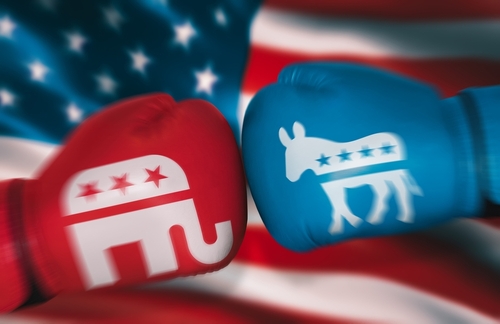
Jacob Chansley, the individual widely recognized as the ‘QAnon Shaman’ due to his distinctive attire during the January 6th Capitol event, has officially declared his intention to run for a seat in the United States Congress. Representing the Libertarian party, Chansley is setting his sights on Arizona’s 8th Congressional District, a move that has already begun to stir up significant media attention and public discourse.
Chansley’s decision comes at a pivotal moment, following the announcement by U.S. Representative Debbie Lesko that she will not be seeking re-election. With the seat opening up in 2024, Chansley sees an opportunity to bring his unique perspective to the political arena, despite the controversy surrounding his past actions.
NEW: QAnon Shaman Jacob Chansley, who was recently released from federal prison for being at the Capitol on J6, appears to be running for Congress.
Chansley will be running as a libertarian candidate according to paperwork that was filed.
The paperwork was filed in the 8th… pic.twitter.com/0lzwMz2xor
— Collin Rugg (@CollinRugg) November 13, 2023
The image of Chansley from January 6th, 2021, has become emblematic of the day’s events. His horned fur hat, face paint, and bare chest made him one of the most recognizable figures. However, Chansley and his supporters argue that his behavior was entirely peaceful, challenging the mainstream narrative that has labeled him as a rioter.
In a recent interview, Chansley articulated his motivations for running and addressed the concerns regarding his past. He presented himself as articulate and well-spoken, qualities that he believes will serve him well in his political aspirations. His notoriety, while a point of contention for some, could potentially be an asset in his campaign, drawing attention and support from those who feel misrepresented by the current political establishment.
The Qanon Shaman Jacob Chansley is running for congress and he has alot to say! #MAGA #AmericaFirst pic.twitter.com/fNd5GyM2xx
— Freyja™ (@FreyjaTarte) November 13, 2023
Chansley’s candidacy raises important questions about the eligibility of individuals with a criminal history to hold office. While the U.S. Constitution does not disqualify felons from serving in federal positions, Arizona law requires that they complete their sentence and have their civil rights restored before they can vote or run for office.
Despite these legal hurdles, Chansley’s bid for Congress is a testament to the diverse nature of American democracy, where even the most unconventional figures can participate in the political process. His run signifies a broader movement among those associated with January 6th to seek public office, challenging the status quo and offering alternative viewpoints.
Critics of Chansley’s candidacy are quick to point out his involvement in the events of January 6th, but his supporters argue that this should not overshadow his right to run for office. They see his bid as a chance to push back against what they perceive as a biased media landscape and a political system that often excludes outsider voices.
As the election approaches, Chansley’s campaign is likely to become a focal point of national interest, sparking debates about redemption, representation, and the boundaries of political participation. His presence in the race is sure to provoke strong reactions from all sides of the political spectrum.
Ultimately, the voters of Arizona’s 8th Congressional District will decide whether Chansley’s past actions define him or if they are willing to embrace his vision for the future. His candidacy is not just a personal endeavor but a reflection of the ongoing struggle within American society to reconcile the events of January 6th with the principles of democracy and forgiveness.










